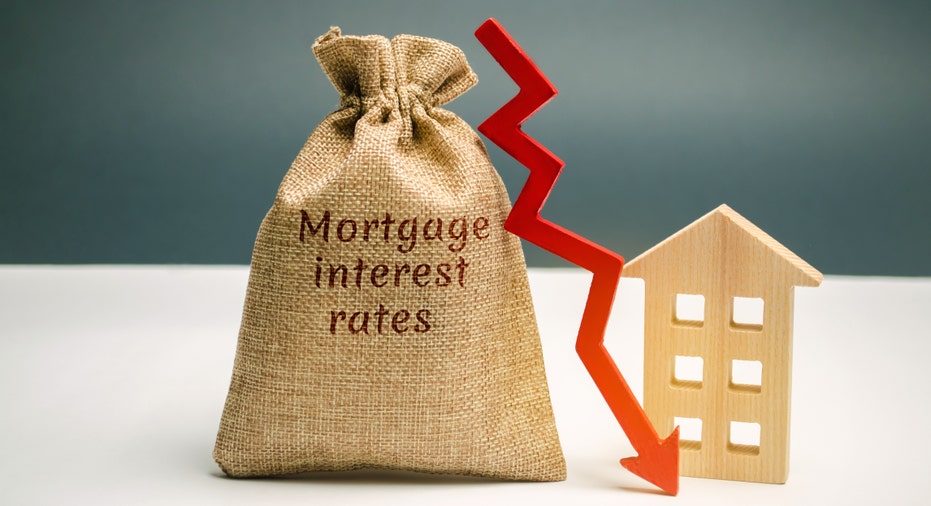Mortgage rates hit new record low — how refinancing now could save you more money

Mortgage rates are at an all-time low in May 2020. Here’s why you should refinance ASAP. (iStock)
Mortgage rates dropped to a new all-time low Thursday to an average 3.15 percent for a 30-year fixed-rate and 2.62 percent for a 15-year fixed-rate, according to Freddie Mac, one of the largest buyers of mortgages in the US.
It's the third record low reported since the coronavirus pandemic hit the country. At the beginning of May, rates fell to 3.23 percent. Rates hit a previous low of 3.29 percent in March when concerns about the virus were starting to emerge.
With numbers like those, it’s no wonder why many people are rushing to refinance. Freddie Mac’s April 2020 Quarterly Forecast Report found that $355 billion worth of refinance originations took place in the first quarter of 2020, up from just $125 billion in the first quarter of 2019.
Based on the current mortgage and refinance rates, it's likely that now is a good time for you to refinance. To understand just how much you could save on your monthly mortgage payments by refinancing now, crunch the numbers and compare rates using Credible's free online tool. Within minutes, you can see what multiple mortgage lenders are offering.
If you’re still wondering whether now’s the right time for you to refinance your home loan, here are some factors you should consider.
3 signs it's time to refinance your mortgage now
You get lower refinance rates and payments
The biggest benefit of lower rates is how much you stand to save on your monthly mortgage payments.
For example, one cost calculator shows that a 30-year mortgage on a $300,000 loan at a 4.3 percent interest rate has a monthly payment of $1,485. At 3.3 percent, that same loan has a payment of only $1,314, which is a savings of $171 per month or $61,469 over the life of the loan.
WHY IT'S A GOOD IDEA TO REFINANCE YOUR MORTGAGE WHILE RATES ARE LOW
Interested homeowners can use their own refinancing calculator or easily fill out Credible's online form to get personalized rates within minutes and to discover potential savings.
You plan on staying in your home long enough to break even
Low mortgage rates aside, it does cost money to refinance your mortgage. You’ll have to weigh your monthly versus how much you’ll pay in closing costs.
You need to change the terms of your mortgage loans
There are many different types of mortgages out there. While new home buyers typically choose a 30-year fixed-rate mortgage to keep their payments low, established homeowners may prefer a 15-year fixed-rate mortgage, which will allow them to pay off their house faster.
FED’S EMERGENCY RATE CUTS AFFECT MORTGAGES — HERE’S HOW YOU CAN BENEFIT NOW
That said, it’s important to do your research to figure out if refinancing fits with your current financial goals. You’ll want to read the repayment terms on your current mortgage and shop around to find the best rate. When you’re ready to compare today's mortgage rates, an online marketplace like Credible can help you start your search.
Should you refinance into a 30-year or a 15-year fixed-rate mortgage?
In particular, since today’s rates are so low, many homeowners are wondering what types of mortgages they should refinance into — a 30-year or 15-year home mortgage. However, like any big financial decision, there are pros and cons for each.
Pros
Lower interest rates: As rates fell to record lows and 30-year fixed-rate mortgages dropped to an average of 3.15 percent, 15-year fixed-rate mortgages fell to an average of 2.62 percent.
Long-term savings: With 15-year fixed rates, you save money long-term by paying less interest overall.
Build equity faster: By choosing a 15-year mortgage, you ultimately pay off your asset faster.
Cons
Higher monthly payments: Since you’re paying off your loan amount in half the time with a 15-year mortgage compared to a 30-year option, your monthly payment is going to be higher.
THE BASICS OF NO-CLOSING COST MORTGAGE REFINANCING
Before doing a mortgage refinance, you should make sure that you’ll feel comfortable handling the payment going forward. You should also consider how long you plan to stay in the home. If you’re not planning on staying put for very long, the length of your mortgage won’t make much of a difference.
Will mortgage rates continue to drop?
While there’s no way to know for certain what will happen in the future, rates are likely to continue to drop. In times of economic uncertainty, the Federal Reserve — the central bank of the U.S. — drops interest rates to encourage people to keep borrowing money and stimulating the economy.
To that end, home buyers will likely continue to see interest rates hit record lows until the pandemic stops surging and the economy has a chance to stabilize.




















